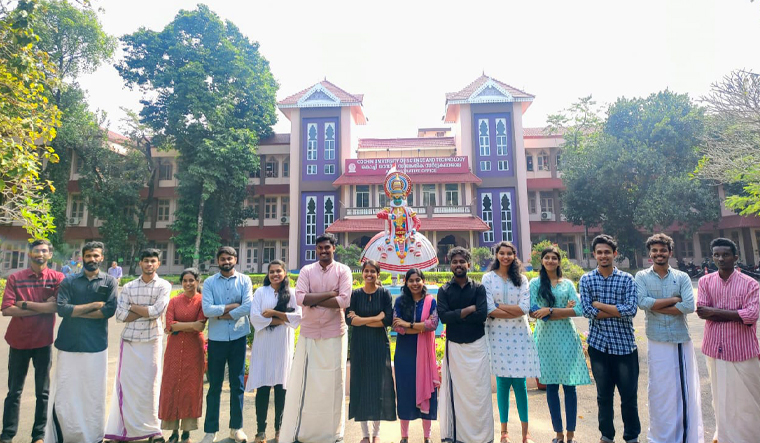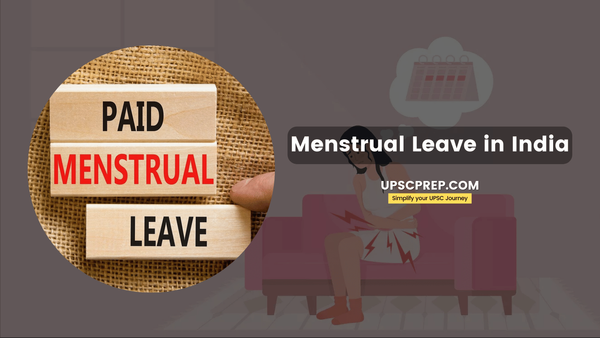Table of contents
The Karnataka government's initiative to consider menstrual leave is a significant step towards addressing gender-specific health needs in the workplace.
Here's a detailed analysis of the situation:

Context and Background
- Menstrual Leave: Menstrual leave refers to the provision of paid or unpaid leave for women during their menstrual cycle.
- This concept acknowledges the physical discomfort and health issues that some women experience during menstruation, which can affect their productivity and well-being.
Development in Karnataka
- Formation of Committee: The Karnataka Labour Department has established an 18-member committee to explore the feasibility of menstrual leave. The committee is headed by Sapna Mohan, Head of the Department, School of Law at Christ University.
- Committee Composition: The committee includes:
- Legal and medical experts
- A psychologist
- Representatives from industries and trade unions
- Labour Department officials
Consultation Process: The committee has already conducted one round of discussions and is set to meet again before submitting its report to the Labour Department.
Potential Extension: There is a possibility that the scope of menstrual leave could be extended to the government sector, including teachers, police personnel, and anganwadi workers.


Existing Policies and Initiatives
- Bihar Government
- Policy: Provides two days of menstrual leave each month since 1992.
- Sector: Applicable to women working in the state government.
- Private Companies
- Zomato: Offers up to 10 days of menstrual leave per year.
- Culture Machine: Implements menstrual leave policy since 2017.
- Gozoop: Provides paid leave for women on the first day of their period.
- Educational Institutions
- Some schools and colleges have started to offer menstrual leave to students to promote a supportive environment.
- Cochin University of Science and Technology (CUSAT):
- Policy: In January 2023, CUSAT introduced menstrual leave for female students, allowing them an additional 2% relaxation in attendance requirements each semester.
- National Law Institute University (NLIU), Bhopal and Maharashtra National Law University (MNLU), Aurangabad recently introduced a menstrual leave policy for their respective students.
- The policy introduced at NLIU Bhopal extends also to gender non-conforming students who menstruate.

Legal Framework
- Labour Laws: Currently, there is no national legislation mandating menstrual leave across India. Policies are primarily driven by state initiatives or private companies.
Current Debate
- Advocacy: Women's rights groups and some policymakers are advocating for nationwide menstrual leave policies.
- Opposition: Critics argue that it could lead to further discrimination against women in the workplace.
Arguments For Menstrual Leave
- Health and Well-being: Recognizes and addresses the health needs of women, promoting their well-being.
- Productivity: Can potentially improve overall productivity by allowing women to take necessary rest and return to work in better health.
- Gender Equality and Sensitivity: Acknowledges gender-specific health issues and promotes a more inclusive workplace environment.
- Employee Satisfaction: Can lead to higher job satisfaction and loyalty among female employees.
Arguments Against Menstrual Leave
- Financial Implications: Additional costs for employers, especially in sectors with a high percentage of female employees.
- Stigma and Discrimination: Potential for reinforcing gender stereotypes and discrimination against women in the workplace.
- Workplace Dynamics: Challenges in implementation and ensuring privacy. Possible resentment among male colleagues.
- Operational Challenges: Managing leave schedules and ensuring continuity of work can be challenging for employers.
- Policy Implementation: Ensuring consistent and fair implementation of the policy across different sectors and organizations.
- Potential for misuse or abuse of the policy.
Global Perspective
Several countries have already implemented menstrual leave policies, providing a reference point for Karnataka:


- Japan: Since 1947, Japan has had a law allowing women to take menstrual leave if they experience difficult periods.
- South Korea: Women are entitled to one day of menstrual leave per month.
- Taiwan: Women can take three days of menstrual leave per year, which is not deducted from their statutory sick leave.
- Indonesia: Women are entitled to two days of menstrual leave per month.
Conclusion
The Karnataka government's initiative to consider menstrual leave is a progressive step towards gender-sensitive workplace policies. The formation of a diverse committee to deliberate on this issue ensures a comprehensive evaluation of its feasibility and implications. The final decision will need to balance the health and well-being of female employees with the operational and financial considerations of employers.
Previous Post